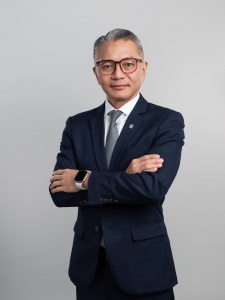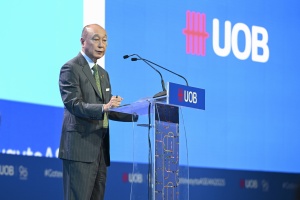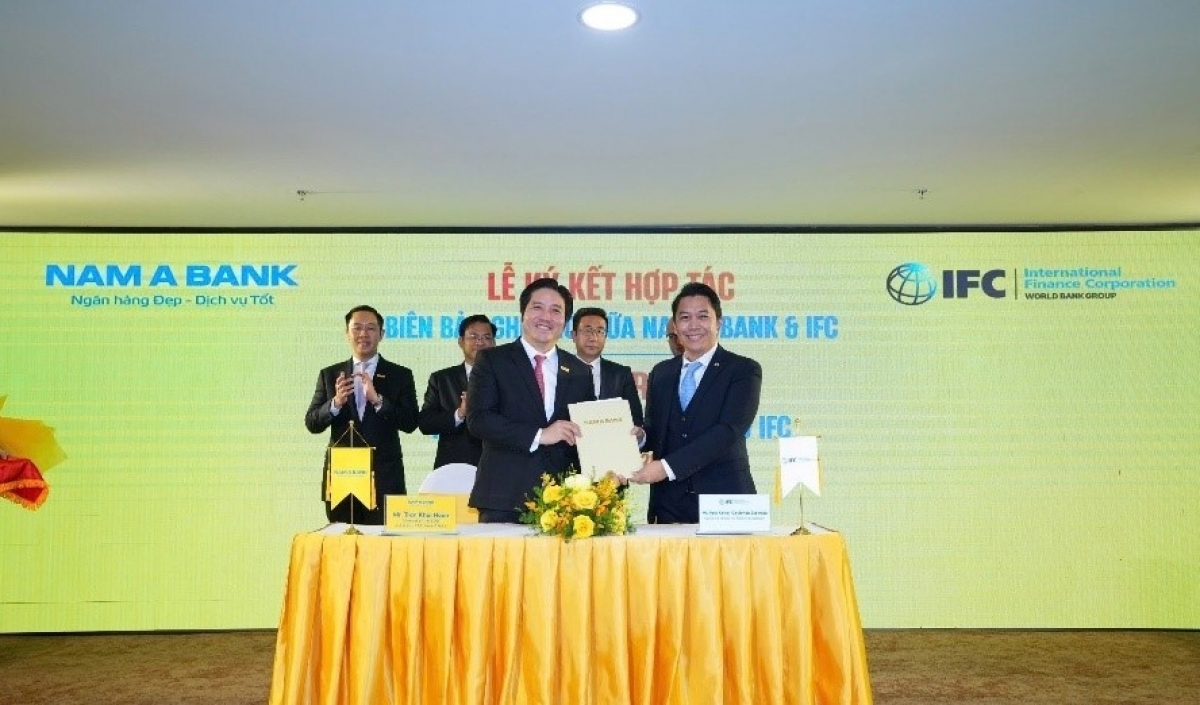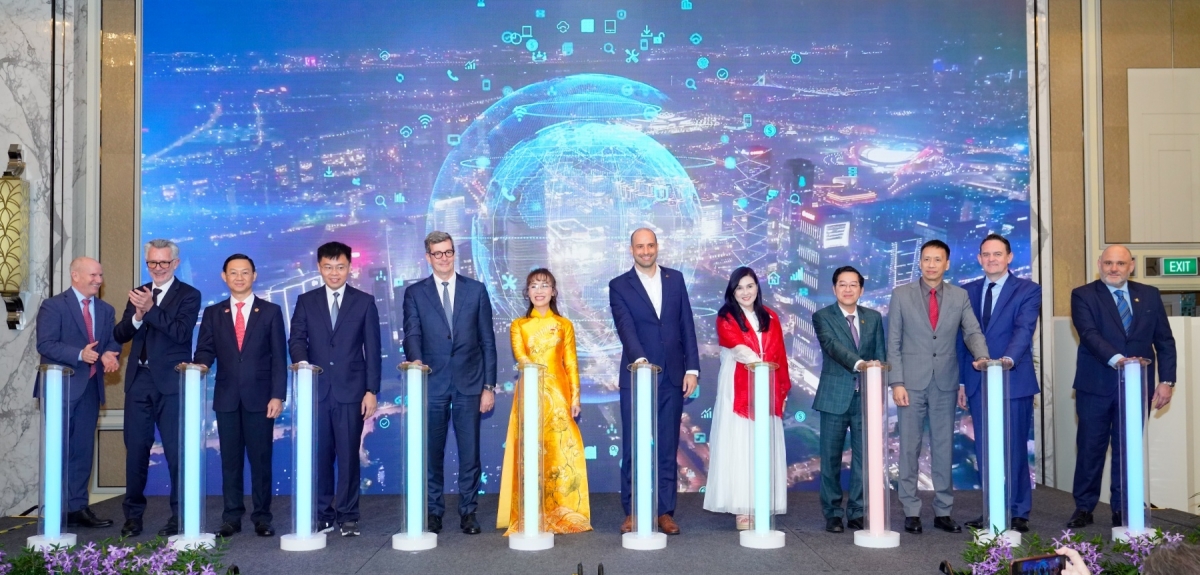INTERNATIONAL INVESTMENT
AND PORTAL
 The Gateway to ASEAN Conference in Singapore
The Gateway to ASEAN Conference in Singapore
At the Gateway to ASEAN Conference in Singapore on October 16, UOB released its latest 'Gateway to ASEAN' report, revealing that business confidence has fallen back to pandemic-era lows amid escalating tariffs and trade tensions.
The report shows that 75 per cent of global executives plan to reconfigure their supply chains within the next three to five years. UOB’s insights, underscored by partnerships such as its collaboration with South Korea’s retail giant Lotte, demonstrate how companies are turning strategy into action in an increasingly fragmented trade landscape.
“A once-in-a-generation supply chain reset is now underway, and ASEAN stands to benefit,” the paper stated. While Bloomberg’s Trade Policy Uncertainty Index shows record-high volatility globally, ASEAN remains resilient. The report found that 52 per cent of businesses are considering 'nearshoring', the relocation of production or supply chains to nearby countries, within the next three years – an approach that began as a crisis response during Covid-19 but has since evolved into a proactive strategy for continuity, market access, and supply chain transparency.
“Diversification is no longer the top strategy to de-risk supply chains,” UOB’s paper noted. Nearly 40 per cent of global businesses cite cost optimisation as their top strategy to de-risk supply chains. Once focused on cheap sourcing, cost optimisation now means smarter inventory management, proactive scenario planning and nearshoring to reduce tariffs, logistics and lead times.
This over-indexing signals that ASEAN is no longer just a manufacturing destination, it’s increasingly seen as a critical in-region hub for storage, fulfilment and distribution. Businesses are looking to strengthen end-to-end operations by building out local infrastructure, shortening delivery timelines and improving regional responsiveness.
The paper stated that ASEAN fits many strategies. Businesses are tapping them all. New customer markets are the top priority in Indonesia, Singapore, and Vietnam, reflecting ASEAN’s growing role as a demand engine.
Meanwhile, cost competitiveness remains strong in Vietnam, Indonesia, and Malaysia. But that’s increasingly balanced with other factors like technology and innovation capabilities and skilled workforce availability.
Businesses aren’t simply choosing ASEAN, they’re building portfolios within it, aligning country-specific strengths.
 Donghyun Kim, chief International Business officer, Lotte International HQ and So Lay Hua, head of Group Transaction Banking, UOB
Donghyun Kim, chief International Business officer, Lotte International HQ and So Lay Hua, head of Group Transaction Banking, UOB
For example, Lotte is actively expanding its presence across ASEAN, with a strategic focus on Vietnam, Indonesia, and Singapore. This year, Lotte launched Lotte Mart Express in Singapore through a 'store-in-store' concept in FairPrice outlets, bringing its Korean brands closer to local consumers. As part of its regional growth, Lotte is also setting up a Digital Hub for International Business in Singapore and a Regional Hub for International Procurement, underscoring its commitment to regional integration.
Recognising the complexity of operating across diverse markets, Lotte has partnered with UOB to support its expansion with tailored financial solutions. In Indonesia, UOB has helped implement a supply chain financing scheme benefiting over 1,000 local suppliers, improving their cash flow and enabling mutual business growth.
“This collaboration is critical for securing reliable product supply and empowering Lotte’s regional scalability. UOB's strong ASEAN presence and local expertise make it an ideal long-term partner for Lotte’s evolving business needs,” said Donghyun Kim, chief International Business officer, Lotte International HQ, at the press conference on the sideline of the Gateway to ASEAN Conference.
Meanwhile, UOB plays a strategic role in supporting major regional clients such as Lotte, providing integrated financial and non-financial solutions across ASEAN.
“Understanding that expansion requires more than financing, UOB focuses on the full procure-to-pay lifecycle, supporting working capital needs from sourcing and inventory to sales and collections,” said So Lay Hua, head of Group Transaction Banking at UOB.
With a strong regional footprint, including more than 90 branches in Indonesia, UOB offers on-the-ground expertise in local regulations and market dynamics to deliver country-specific solutions.
“UOB’s strength lies not just in its network, but also in its dedicated country teams who work closely with clients at the local level,” added So.
The bank enables Lotte to manage its complex supply chain through flexible, phased financing structures and digital tools that simplify cross-border operations.
“Ultimately, UOB’s profound understanding of the consumer retail sector, combined with its ASEAN-wide infrastructure, allows it to deliver effective support for Lotte’s regional ambitions,” she said.
 Singapore bank unveils Southeast Asia's first consumer mood ring
Singapore bank unveils Southeast Asia's first consumer mood ring
When bankers try to decode 650 million people's financial feelings, the resulting index promises either valuable insights or the world's most expensive opinion poll.
 Investment outlook shines amid global trade shifts
Investment outlook shines amid global trade shifts
Vietnam is emerging as a bright spot for attracting foreign direct investment and as one of the most promising markets, drawing strong interest from international investors. Lim Dyi Chang, country head of Commercial Banking at UOB Vietnam, discussed with VIR’s Thanh Van his insights on the country’s evolving investment outlook.
 UOB raises Vietnam 2025 growth forecast to 7.5 per cent
UOB raises Vietnam 2025 growth forecast to 7.5 per cent
United Overseas Bank (UOB) has raised its 2025 growth forecast for Vietnam, citing strong first-half performance and government-led investment momentum.
 Rewiring global trade: ASEAN’s rise as supply chain hub
Rewiring global trade: ASEAN’s rise as supply chain hub
ASEAN is emerging as a strategic hub for global supply chain reconfiguration, while smart partnerships are key for regional businesses to thrive in this diverse and dynamic region.



















